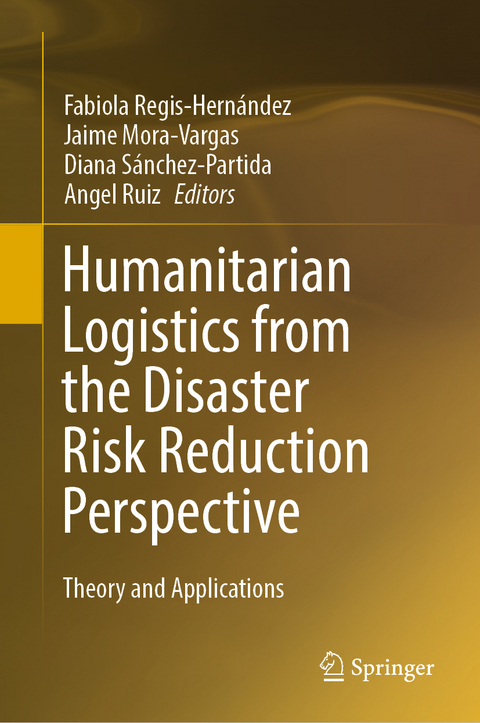
Humanitarian Logistics from the Disaster Risk Reduction Perspective
Springer International Publishing (Verlag)
978-3-030-90876-8 (ISBN)
The target audience of the book includes professionals who work in Linear Programming, Logistics, Optimization (Mathematical, Robust, Stochastic), Management Science, Mathematical Programming, Networks, Scheduling, Simulation, SupplyChain Management, Sustainability, and similar areas. It can be useful for researchers, academics, graduate students, and anyone else doing research in the field
lt;p>Fabiola Regis Hernández Ph.D., is a professor in the Industrial Engineering Department of the Engineering and Sciences School of Tecnologico de Monterrey (San Luis Potosi, Mexico). Her research interests are on network flow problems, discrete optimization, multi-objective programming, approximation techniques, and heuristic approaches. Her research is focused on real-life applications, such as humanitarian logistics, healthcare, and emergency management systems. Her research has been developed in collaboration with Université Laval, HEC Montreal, and Istituto di Matematica Applicata e Tecnologie Informatiche (IMATI).
Jaime Mora-Vargas, Ph.D., is a professor-researcher in Tecnologico de Monterrey (Estado de Mexico, Mexico). His research area includes the development and implementation of algorithms for the solution of combinatorial problems, based on hybridizations between algorithms exact and advanced artificial intelligence methods. His work has been developed in collaboration with renowned groups of institutions such as MIT, HEC Montreal, Université Laval, Eindhoven University of Technology, Naval School of Cadets Almirante Padilla, among others.Part I Pre-Disaster.- 1. Impact of Mexican Public Policies in the development of COVID-19 Pandemic.- 2. Clustering of Highly Vulnerable Mexican Municipalities to Develop Humanitarian Public Policies.- 3. Strategies that improve the performance of the humanitarian supply chain.- 4. Water resources in Mexico and their implications in the phenomenon of drought.- 5. A Proposal to the Reduction of Carbon Dioxide Emission in Inventory Replenishment: Mitigating the Climate Change.- 6. Theoretical approach to risk reduction since urban form.- 7. Allocation Model Applied to Preventive Evacuation for Volcanic Risk in Localities Near the Popocatepetl Volcano in Puebla, Mexico.- 8. Identification of homogeneous hydrological administrative regions in Mexico using analysis of variance.- Part II Post-Disaster.- 9. Optimising distribution of limited COVID-19 vaccines: Analysing im-pact in Argentine.- 10. Location of RegionalHumanitarian Response Depot (RHRD) in the Seven Regions in the State of Puebla.- 11. Location of Humanitarian Response Distribution Centers for the State of Chiapas.- 12. Distribution of Personal Protective Equipment, derived from the Pres-ence of the COVID-19 Virus in Mexico.- 13. A prediction model to determine a COVID-19 patient's outcome based on its risk factors.- 14. Application of a Markov Decision Process in Collection Center Opera-tions.- 15. Decision-Support Tool for Coordination of Volunteers during Lock-downs.- 16. Facilities Location under Risk Mitigation Concerns.- Part III Multi-criteria approaches.- 17. An Integrated FAHP-based Methodology to Compute a Risk Vulnera-bility Index.- 18. A multi-criteria decision-making framework for the design of the re-lief distribution routes.
| Erscheinungsdatum | 16.02.2022 |
|---|---|
| Zusatzinfo | XII, 516 p. 178 illus., 124 illus. in color. |
| Verlagsort | Cham |
| Sprache | englisch |
| Maße | 155 x 235 mm |
| Gewicht | 1029 g |
| Themenwelt | Naturwissenschaften ► Biologie ► Ökologie / Naturschutz |
| Naturwissenschaften ► Geowissenschaften ► Geologie | |
| Schlagworte | decision-making process • disaster risk reduction • Humanitarian Logistics • Management Science • natural disasters • Resilience • Supply Chain Management • sustainability |
| ISBN-10 | 3-030-90876-3 / 3030908763 |
| ISBN-13 | 978-3-030-90876-8 / 9783030908768 |
| Zustand | Neuware |
| Haben Sie eine Frage zum Produkt? |
aus dem Bereich


